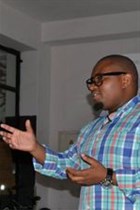






Sending a CV is not a unique tactic or approach. It's expected, and also, you are not the only one doing it.
Usually, when CVs are being requested or required, they come in droves. Competition gets tighter and tougher. How do you make your CV or résumé stand out or count? As professionals, our careers are no different to any brand; we have to put in some thinking and work into ensuring that we stand out from the pack.
How do you get an interview for a position that doesn't exist? Here's how I did it, and perhaps this may be useful to employment seekers.
Before LinkedIn was as prominent as it is today (at least in my world), there was Twitter. Can one land an interview from or on Twitter? Of course, and I did. Referring back to my point about this being the most exciting time to live, my story illustrates that anything is possible. The internet has given power to the user, enabling us to dictate terms on certain facets, like how one can be noticed as a potential employee. I used Twitter to get an interview with one of my potential employer. This was a person I admired and thought that I'd learn so much from. Here's how I got the interview.
My potential employer, who I admired from a distance, had a passion or interest for running. How do I know it was their passion? They posted about it on Twitter almost every single day. They posted the kilometres that they had run each morning. For example, they'd post, "I ran 10.5km today", or "I ran 8.9km today". To me, this was data. I knew that by tapping into this passion of theirs, I'd appeal to them. So, how did I appeal to them?
Usually, CVs/résumés are about the person sending the CV/résumés. Rarely do CVs/résumés talk to or make significant reference to the receiver. This was my insight. So I flipped the script and made the recruiting process as much about my potential recruiter/boss, as much as it was about me.
I took their achievements, "kilometres ran", and turned it into a challenge. For every set of kilometres they covered or ran, I converted them to minutes, thereby challenging them to read through my portfolio and CV within those minutes. For example, if they ran 10km, I'd ask them to read my portfolio in 10 minutes. If they ran for 8 minutes, I'd challenge them to go through it in 8 minutes.
I wasn't applying for a position, I was applying to work with or under them (it was personal).What I was able to achieve with my attention
I was the only one who was interested in them being interested in me.
I was the only one engaging her about her passion or interest (when I observed the engagement level on their tweets, nobody was engaging them - nobody liked or retweeted their "achievements"). You must remember that whenever you post something, you are naturally expecting a response or engagement. Social media is like having a normal face-to-face conversation; nobody likes to speak to themselves.
I don't think anybody had ever shown that much interest in having them as their boss or manager, especially on a public platform. To any human being, that is heartwarming.
I showed interest in them, not the position. My efforts and intentions were solely in working under them, and not necessarily the ad agency (it was about them, as much as it was about me). I wasn't applying for a position, I was applying to work with or under them (it was personal).
It was an interesting way to get attention, to be noticed. At that time, it was unconventional (Novelty breeds interest and curiosity - that's why they eventually agreed to see me). The thing about being noticed is that you have to do what no-one else is doing. Clichéd, but you'd need to be different. Literally.
I think the internet provides opportunities to do things differently. It allows us to break the monotony of the system and "this is how we've always done things".
I didn't get the job. I think the reason I didn't get the job is because there was no position available, to begin with. Or it could be that the potential employer just didn't believe in me. Or they failed to see beyond the inexperience. I think even though one can be enthusiastic, people still operate within the confinement of the "system". I was probably a risk. Which I understand. It could be a myriad of reasons why I was not hired.
Apply to be under the person you admire, not the position.But, I got the interview. I legally walked into a building I otherwise wouldn't have walked into had I not captured their attention.
During the time I was applying, I was not employed and was desperate to be employed. I suppose it was this desperation that led to my unconventional approach to getting an interview. Desperation doesn't mean that one has to beg for a job the conventional way. Your desperation can be channelled in a way that may lead to you being given a shot.
I may not have gotten the job, but what I did get is a lifetime of confidence in myself, because ever since that moment, I've tried to do things in an unconventional way. I don't think that I've done too badly as I do believe that I have been able to get the attention of many people.
Maybe you shouldn't wait for the job opening, open the door for yourself by creating that job. Be noticed. Apply to be under the person you admire, not the position.
Don't go for the position, go for the experience and the opportunity to learn from someone. That means you need to know "who" you are willing to work under, versus the position.
Do and say things you wish were done or said.
